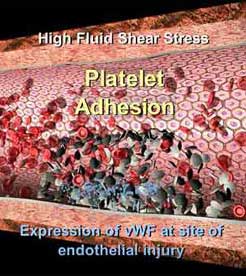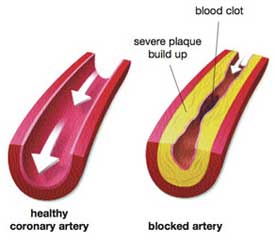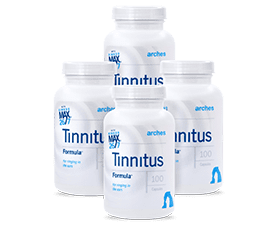By Barry Keate
Barry Keate, has lived with tinnitus over 40 years and has published 150+ research articles on numerous aspects of tinnitus. He is an expert on the condition and a well-known advocate for those with tinnitus.
Editor’s note: Arches Tinnitus Formula™ contains a premium-grade Ginkgo biloba extract and is known to “thin” the blood. It should not be taken by individuals who are taking prescription blood thinners (e.g., Coumadin, Plavix) without the advice of one’s personal physician. Additionally, it should be discontinued two weeks prior to any surgical procedure. Read a review of 19 clinical studies regarding Ginkgo blioba extract for tinnitus.
Ginkgo biloba extract (GBE) is known to thin the blood and increase blood flow. This is particularly helpful in the small capillaries of the brain, eyes and ears and is just one of a number of reasons why ginkgo is helpful for tinnitus.
Over the years I have been frequently asked if it is safe to take Arches Tinnitus Formula™, which contains GBE, along with other blood thinning supplements and medications. In this article we will explore the subject of ginkgo and other blood thinners and the various supplements and medications that can be safely used and those that pose potential complications.
For our discussion here please note that whenever I say ginkgo or Ginkgo biloba, I am always referring to the standard 24/6 Ginkgo biloba extract. Also note that there are many prescription and nonprescription blood thinners on the market. In this paper I refer to three common blood thinners: Coumadin, Plavix and aspirin. All are popular, each one is used for different reasons and while all thin the blood, they do so in different ways.
PAF Blocker
First, it is necessary to understand the mechanisms by which ginkgo thins blood and increases blood flow. It does this in two different ways. Ginkgolide B, one of the constituents of Ginkgo biloba, is a potent inhibitor of excess platelet-activating factor (PAF) by blocking the binding of PAF to its receptor. (1)
 PAF is made in the blood from platelets and causes them to aggregate or “clump” together. Under normal conditions, this action is necessary for the formation of blood clots to stop bleeding. With excessive PAF, blood clots and atherosclerotic plaque begin to build up. Atherosclerosis is the leading cause of heart attack and stroke.
PAF is made in the blood from platelets and causes them to aggregate or “clump” together. Under normal conditions, this action is necessary for the formation of blood clots to stop bleeding. With excessive PAF, blood clots and atherosclerotic plaque begin to build up. Atherosclerosis is the leading cause of heart attack and stroke.
An excess of PAF in the bloodstream also causes allergic reactions, which can lead to bronchial constriction, where the bronchial tube closes down. It can lead to life threatening inflammation of the airways that induce asthma-like symptoms. It causes a drop in blood pressure and reduced volume of blood pumped by the heart, which can lead to shock and possible death. (2)
Ginkgo biloba has many cardio-protective effects and the antagonism of PAF is one of them. We’ve all seen those TV ads for Plavix where the platelets are partially obstructing a blood vessel. By taking Plavix, they begin to reduce and dissolve. This is the primary function of Plavix; reducing PAF. In this sense, Plavix and ginkgo are similar. However, PAF reduction is only one of the many positive functions of ginkgo.
Vasodilation
The second way ginkgo increases blood flow is through vasodilation, especially in the micro-capillaries that carry blood to the brain, eyes and ears.
Vasodilation is the process by which the blood vessels relax and dilate, allowing increased blood flow. This process allows more blood to reach places where it is required to supply nutrients. At the same time, ginkgo strengthens blood vessel walls, reducing leakage and preventing hemorrhagic stroke.
 One study showed that Ginkgo biloba was very helpful for patients with coronary artery disease (CAD) because it significantly improved blood flow through vasodilation. Ginkgo significantly improved blood flow through the descending coronary artery and the brachial artery (in the upper arm) saw increased blood flow of 69.75%. (3) It is also helpful for intermittent claudicating, a peripheral vascular disease, where poor circulation causes pain while walking. (4)
One study showed that Ginkgo biloba was very helpful for patients with coronary artery disease (CAD) because it significantly improved blood flow through vasodilation. Ginkgo significantly improved blood flow through the descending coronary artery and the brachial artery (in the upper arm) saw increased blood flow of 69.75%. (3) It is also helpful for intermittent claudicating, a peripheral vascular disease, where poor circulation causes pain while walking. (4)
Increased Bleeding with Ginkgo?
In the 1990s there was some speculation that taking Ginkgo biloba posed the problem of increased bleeding. There were a few reports of people using ginkgo and having a subdural hematoma, or bleeding on the brain. These reports were very few and anecdotal in nature. There was no clinical evidence that this was the case.
Nonetheless, one doctor posted a warning that received wide circulation on the Internet. This report has been widely criticized as there have been numerous clinical studies to determine if ginkgo increased bleeding time or led to hemorrhage. Bleeding time is the time it takes to form a clot, which stops the bleeding.
A paper published by the Dr. Willmar Schwabe Company of Germany (developer of GBE) cites several clinical studies in this area. One study on combing ginkgo with acetylsalicylic acid (aspirin) proved that there are no indications of a greater risk of hemorrhaging with ginkgo alone or in combination with aspirin. (5)
Another study was conducted due to reports of spontaneous bleeding. This study reported “no major modification of bleeding time and volume was observed for any of the subjects” and “Platelet function was not modified by treatment.” (6)
Yet another study investigated Ginkgo biloba on hemostatic parameters (the slowing or stopping of bleeding). The study’s main outcome measures were bleeding time, coagulation parameters and platelet activity. The study concluded “Among the 29 coagulation and bleeding parameters assessed, none showed any evidence of an inhibition of blood coagulation and platelet aggregation through EGb 761(GBE). Further the study did not reveal any evidence to substantiate a causal relationship between the administration of EGb 761 (GBE) and hemorrhagic complications”. (7)
So Ginkgo does not cause bleeding in healthy people. The issue is: what can we combine it with that will not cause concerns and what should we be careful about.
Coumadin is a powerful anticoagulant that acts by inhibiting Vitamin K-dependent coagulation factors. As noted above, Plavix is an inhibitor of platelet activating factor. These drugs, and others like them, thin the blood. They are hundreds of times more potent than Ginkgo biloba but thin the blood in much the same way.
Doctors prescribe these medications to patients in order to thin the blood as much as possible to reduce the possibility of heart attack or stroke. Adding Ginkgo biloba to the mixture without the doctor’s knowledge and understanding may thin the blood too much and increase the risk of bleeding, either internally or externally. This is a very dangerous situation that can lead to bleeding problems.
There are no adverse interactions between ginkgo and these medications; they are simply cumulative in nature. It is possible to take them together but it must be done under the supervision of the prescribing physician. The doctor will typically lower the dosage of the anticoagulant medication to accommodate the increased blood thinning ability of ginkgo.
This normally requires a couple of follow-up blood tests to make sure there is enough coagulation to stop bleeding. Once everything is in balance, the two products can be taken together indefinitely. The prescribing physician must be willing to balance the effects of anticoagulants and ginkgo. Some doctors are opposed to the use of herbal supplements and may not be cooperative.
OTC Bloodthinners
There are many supplements, foods and over-the-counter medications that are blood thinning agents. Aspirin is also an antagonist to PAF. Vitamin E, garlic and fish oil all have blood thinning capabilities. Aspirin is prescribed for many people with heart conditions primarily because it is a PAF antagonist.
It is perfectly safe for most people to combine any and all of these over-the-counter products with ginkgo provided it is done in moderation. Those who have a tendency to bleed easily will want to be cautious. A single aspirin a day, whether it is an 81 mg “baby” aspirin or a full-strength 325 mg aspirin will not thin the blood enough to cause problems. I take Arches Tinnitus Relief Formula, containing Ginkgo biloba, vitamin E and fish oil every day with no bleeding issues.
The key word here is moderation. Last summer I was doing some intense recreating and developed very sore muscles in my legs and my lower back. I cannot take ibuprofen because it sends my tinnitus through the roof. Acetaminophen is liver poison as far as I am concerned. So I began to take 3 aspirins daily, along with my regular supplements. I continued for 3-4 days then stopped. The next evening I developed a nosebleed that would not stop and had to go to the emergency room. A couple of inhalations of Afrin was all it took to stop it (Afrin is a vasoconstrictor) but I learned my lesson. Be aware and moderate in using combinations of ingredients that can thin the blood.
References
- 1 – Chung KF, Dent G, McCusker M, et al., Effect of a ginkgolide mixture (BN 52063) in antagonizing skin and platelet response to platelet activating factor in man. Lancet 1987 Jan 31;1(8527);248-51.
- 2 – http://en.wikipedia.org/wiki/Platelet-activating_factor.
- 3 – Yuzhou W, Shuquin L, Wei C, Xiunguang Z, Fengfei W. Jun D. Ginkgo biloba extract improves coronary blood flow in patients with coronary artery disease: Role of endothelium-dependent vasodilation. Planta Med 2007;73:624-628.
- 4 – Blumenthal M, et al. The Complete German Commission E Monographs: Therapeutic Guide to Herbal Medicine. American Botanical Council, July 19, 1994.
- 5 – Kohlers S. Examination of the effect of Ginkgo biloba special extract EGb 761 and of the interaction between ASA and Ginkgo biloba special extract EGb 761 regarding coagulation. Medical report 27.09.1999. Dr Willmar Schwabe Arzneimittel GmbH & Co. Karlsruhe.
- 6 – Sollier C, Caplain H, Drouet L. No alteration in platelet function or coagulation induced by EGb 761 in a controlled study. Clinical Lab Haem 2003, 25, 251-253.
- 7 – Kohler S, Funk P, Kieser M. Influence of a 7-day treatment with Ginkgo biloba special extract EGb 761 on bleeding time and coagulation: a randomized, placebo controlled, double-blind study in healthy volunteers. Blood Coagulation and Fibrinolysis 2004, 15:303-309.
Get Free Shipping!
Order now and get free shipping on either the Tinnitus Starter Kit or Combo Pack. Try the doctor recommended products with clinically proven ingredients for tinnitus. No coupon code required.

